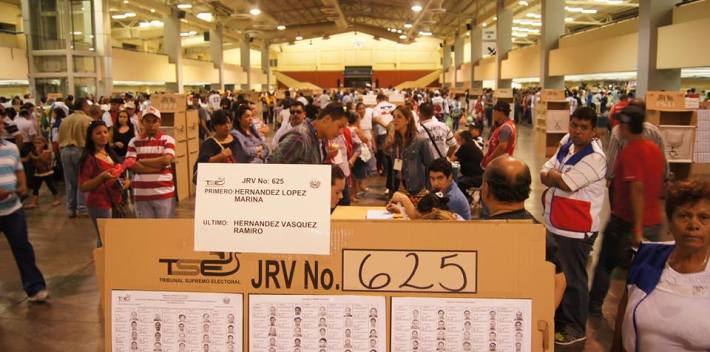
EspañolOn Tuesday, April 28, the Constitutional Chamber of El Salvador’s Supreme Court (CSJ) issued a resolution preventing 24 deputies elected from the department of San Salvador from taking their seats in the National Assembly.
The Court issued the ruling after the Supreme Electoral Tribunal (TSE) failed to comply with an order for a recount, following legal claims by a group of candidates that cast doubt on the election results.
“The inauguration of the allegedly elected members for the Legislative Assembly by the department of San Salvador for the period 2015-2018 has been suspended,” the ruling reads. “The requested vote count should continue under the same conditions set on April 17, 2015, until its completion.”
However, Sigfrido Reyes, president of the Legislative Assembly and founding member of the political party Farabundo Martí National Liberation Front (FMLN), branded the Court’s measure a “technical coup.”
“These sorts of resolutions have been practically a technical coup, because a coup does not only mean deposing a president,” Reyes said on Wednesday.
“Trying to thwart or prevent the installation of a fundamental branch of government, such as the Legislative Assembly, which in terms of our political tradition is regarded as the first organ of the state given that it is the direct representation of citizens, may amount to that,” the FMLN leader added.
Reyes further stated that the Court’s decision violates the Constitution and could potentially end in a political crisis for the country. According to the Legislative Assembly president, the leaders of the different political parties will meet in order to find a unified position against the injunction.
Congresswoman Jackeline Rivera of the FMLN also voiced her opposition to the Court’s decision and invited the newly elected members to disobey the resolution. “The FMLN will not comply with the precautionary measure of the Chamber, and all the elected members will assume office on May 1,” she stated.
FMLN Elections Secretary Norma Guevara similarly stated that there is no court ruling that could alter what has already been defined in the polls.
El TSE es la máxima autoridad en materia electoral. Ya resolvió conforme al voto de la ciudadanía. Ninguna diligencia judicial cambia eso.
— Norma Guevara (@guevara_tuiter) April 28, 2015
“The TSE is the highest authority in electoral matters, and it resolved according to the citizenry’s vote. No judicial process can change that.”
Technical Difficulties
In the days following the March 1 parliamentary and municipal elections, Salvadorans were prevented from knowing the official results due to “technical problems” cited by the TSE.
Despite the lack of verified results, both major political parties of El Salvador, the ruling FMLN and the opposition Nationalist Republican Alliance (ARENA), declared themselves the victors based on their own counts.
Nevertheless, the TSE reiterated that the election winners would only be confirmed after the completion of the final count.
It took 27 days for the Supreme Electoral Tribunal to formalize the results of the election. On March 28, the TSE declared ARENA victorious, with 36 deputies in the Assembly, while the FMLN only won 31 seats.
Recount Demands
On March 30, four candidates to the Legislative Assembly from opposition parties National Coalition (PCN), Christian Democratic Party (PDC), Grand Alliance for National Unity (GANA), and Democratic Change (CD), filed a legal challenge with the TSE, questioning the official results of the election.
The TSE dismissed the claims, prompting the candidates to file constitutional complaints with the Supreme Court. The Constitutional Chamber then ordered the TSE to recount the votes in the parliamentary election in the department of San Salvador on the grounds that the rights of these four candidates had been violated.
The Court also stated they had detected anomalies in the vote counts that prevented them from being able to “guarantee the purity” of the results. The Court set April 21 as the deadline for the recount, but the TSE failed to comply due to delays in the process.
The Court then extended the tribunal’s deadline to April 27, but the TSE was once again unable to complete the recount in time and filed for an extension to May 21.
As of April 28, the TSE had only complete 17 percent of the recount, leaving more than a thousand polling stations still unchecked.
On Friday, May 1, 60 of El Salvador’s newly elected deputies from the remaining 13 departments, excluding San Salvador, took their seats in the National Assembly.
Rebeca Morla translated and contributed to this article. Edited by Guillermo Jimenez.
 Versión Español
Versión Español












